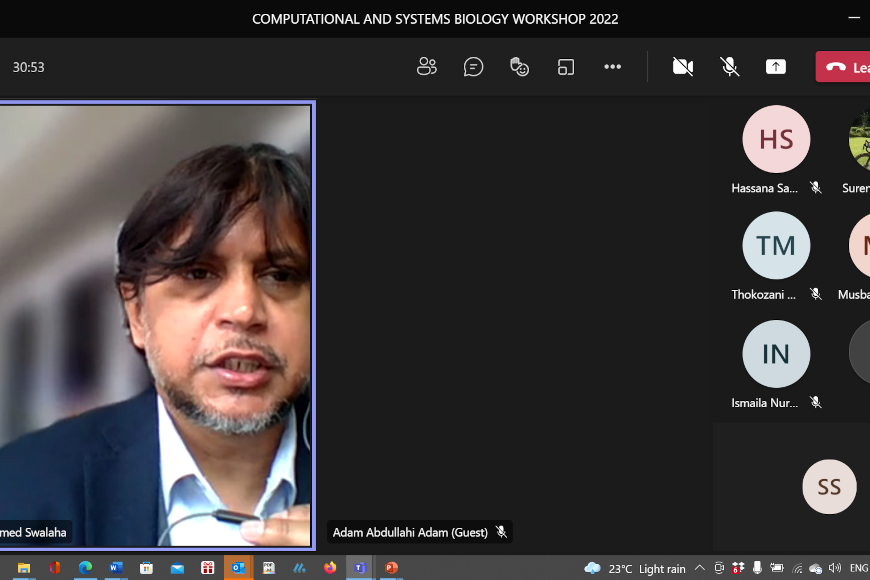A Computational and Systems Biology Workshop 2022 was recently hosted online by the Department of Biotechnology and Food Science at the Durban University of Technology (DUT) via Microsoft Teams.
The workshop introduced technologies, tools, and advanced bioinformatics resources for computational and systems biology data, with emphasis on secondary metabolites of therapeutic importance.
The workshop brought together researchers from eight national and international universities:Brock University (Canada), University of Cape Town (South Africa), University of Zululand (South Africa); University of the Free State (South Africa); University of Ilorin (Nigeria); Federal University Dutse (Nigeria); Nile University (Nigeria); and DUT (South Africa), to discuss advances and technological tools in computational biology and how to utilise the power of digital tools in drug discovery and development processes.
The workshop was an initiative of Dr Saheed Sabiu, who is currently leading the Computational Drug Discovery and Development Research Group in the Plant Biotechnology and Indigenous Knowledge Systems Research Focus Area of the University, where students and emerging researchers in this field are being trained and mentored. Dr Sabiu is a Senior Lecturer at the Department of Biotechnology and Food Science, DUT, and his research is focused on therapeutic mechanisms of secondary metabolites in degenerative and microbial diseases in a way that will provide valuable data for drug discovery and development.
The workshop was opened by the Executive Dean: Applied Sciences, Prof Suren Singh, who commended the appropriateness of the programme, and stressed that it was in tune with the University’s visions of fostering research, networking, knowledge transfer and human capacity development, and international collaboration engagement among researchers.
The Head of Department, Biotechnology and Food Science, Prof Feroz Swalaha, welcomed all the participants and particularly the three invited speakers: Prof Khajamohiddin Syed (University of Zululand, South Africa); Prof Henry Ademola Adeola (University of Cape Town, South Africa); and Dr Nurain Ismaila (Brock University, Canada), and urged the attendees, especially the postgraduate students, to extract maximum benefit from the programme.
The scientific programme was introduced by Prof Kugen Permaul (DUT), who gave a general overview of the workshop with emphasis on computational biology and bioinformatics as integral components of molecular biotechnology.
Prof Khajamohiddin Syed, presented on “Bacterial genome mining for novel secondary metabolites: Special focus on P450s” and concluded on the fascinating nature of cyanobacteria as potential agents for novel drug discovery and development.
Prof Henry Ademola Adeola provided an overview on the “Computational methods for label-free shotgun clinical proteomics” with emphasis on various tools and resources for in-depth analyses on the subject.
The pinnacle of the event was the hands-on training on computational and systems biology in drug discovery and development. This was presented by Dr Nurain Ismaila, who showcased different software and molecular modelling materials and resources in drug development, and the participants had the privilege of first-hand engagement in navigating through the described pipelines. The session was further supported by Dr Sabiu.
Speaking on the programme, Dr Sabiu said the main objective of the programme was to encourage exchange of ideas and specifically to foster collaboration between the participating researchers and for knowledge transfer and capacity development, particularly within the niche of computational and systems biology applications for bioprospecting of small molecular targets of therapeutic significance.
The workshop was well-attended by over 70 participants from the participating institutions, with postgraduate students constituting more than 50% of the attendees. The presence of established experts in bioinformatics has already allowed fostering of new collaborative engagements among the participants with common research interests.
Judging by the feedback received at the end of the event, the participants craved for more such programmes, and another session is being planned for a later this year. This initiative has helped in realising the goal of capacity building and knowledge transfer to students and emerging researchers in the field of computational and systems biology for drug discovery and development.
Pictured: Attendees at the online Computational and Systems Biology Workshop.
Supplied by the Department of Biotechnology and Food Science.


